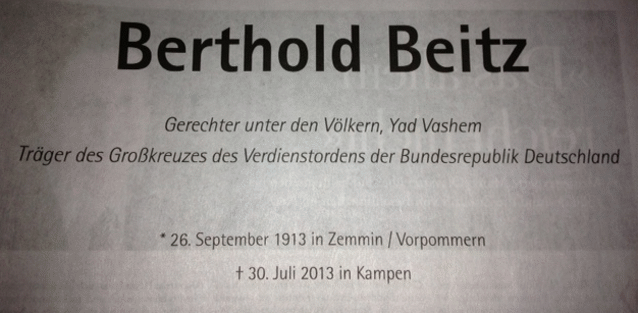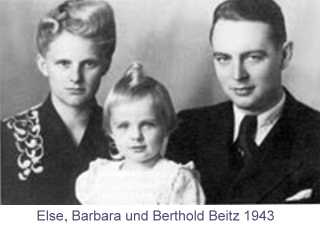|
Gustav
Krupp, Reinhard Heydrich, and Berthold Beitz German industrialist Berthold Beitz, the “grand old man of steel,” died on July 30 at 99 years of age. Beitz turned the privately run Krupp Steel company into a publically traded corporation that is now ThyssenKrupp
Steel  . . Beitz was born in 1913 in
Zemmin  ,
Hither Pomerania. He began his career as a banker at the "Pommersche Bank" in Stralsund and started to work for Shell Oil Company in Hamburg in
1938. When World War II began in 1939, he was not recruited by the German army, but remained in the employ of
Shell Oil. In October 1939, he was sent by his employer, the Rhenania-Ossag ,
Hither Pomerania. He began his career as a banker at the "Pommersche Bank" in Stralsund and started to work for Shell Oil Company in Hamburg in
1938. When World War II began in 1939, he was not recruited by the German army, but remained in the employ of
Shell Oil. In October 1939, he was sent by his employer, the Rhenania-Ossag
 , to the
Southern
Polish towns of Jasło , to the
Southern
Polish towns of Jasło  and Krosno
and Krosno  , in order to work at the Beskiden-Erdöl-Gewinnungs-GmbH , in order to work at the Beskiden-Erdöl-Gewinnungs-GmbH
 , a
subsidiary of Rhenania-Ossag, as a leading commercial clerk. Beitz married in December 1939, and after the birth of their twin-daughters Barbara und Inge, his wife Else followed her husband to
the 'Generalgouvernement' , a
subsidiary of Rhenania-Ossag, as a leading commercial clerk. Beitz married in December 1939, and after the birth of their twin-daughters Barbara und Inge, his wife Else followed her husband to
the 'Generalgouvernement'  . .
In 1941 his grandfather, who was a devout Nazi, took him to a dinner at the home of Gustav
Krupp  ,
head of a major munitions company, where Reinhard Heydrich ,
head of a major munitions company, where Reinhard Heydrich  , chief of the Nazi Security Police, was a guest. When Heydrich mentioned oil refineries had been taken
over in Western Ukraine, and were to be subsidiaries of Royal Dutch Shell, an enthusiastic Berthold
Beitz (27 years old) put himself forward, and was given a commercial directorship of the 'Karpathen-Öl AG' , chief of the Nazi Security Police, was a guest. When Heydrich mentioned oil refineries had been taken
over in Western Ukraine, and were to be subsidiaries of Royal Dutch Shell, an enthusiastic Berthold
Beitz (27 years old) put himself forward, and was given a commercial directorship of the 'Karpathen-Öl AG'
 in Boryslaw
in Boryslaw  .
There, according to his narrative, he went to Gestapo .
There, according to his narrative, he went to Gestapo  headquarters and received authorization to supplement the refinery workforce with Jews scheduled for deportation. Every day he recruited from the train station “tailors, hairdressers, students from Talmudic colleges, etc.” as “petroleum
technicians”. In Boryslaw, Beitz remained until March 1944, when he was drafted into the German army.
headquarters and received authorization to supplement the refinery workforce with Jews scheduled for deportation. Every day he recruited from the train station “tailors, hairdressers, students from Talmudic colleges, etc.” as “petroleum
technicians”. In Boryslaw, Beitz remained until March 1944, when he was drafted into the German army. At the end
of the war, he became a Russian war prisoner, but escaped after a short time. In August 1946, 32
years old Beitz was nominated by the British occupation forces Vice-President of their
Insurence Control Authority. Thereafter, he was building a successful career in insurance, when a meeting in 1952 with the heir
to the Krupp dynasty, Alfried Krupp von Bohlen und Halbach  , the son of the man Beitz had met in
1941, was to change his life. , the son of the man Beitz had met in
1941, was to change his life. In 1953, Krupp owner Alfried Krupp von Bohlen und Halbach appointed
Beitz chief executive officer of his company. He revived its steel base and traveled outside Germany
to enter foreign markets for building industrial plants, using Beitz’s reputation to win orders from
the eastern bloc. Krupp became the first German company to pay reparations to Jewish concentration-camp
survivors. In 1973, Yad Vashem
 named him to its 'Righteous Among the Nations'.
named him to its 'Righteous Among the Nations'. Mr. Beitz
 is survived by his wife of more than 70 years, Else; three daughters, Barbara
Ziff
is survived by his wife of more than 70 years, Else; three daughters, Barbara
Ziff  ,
Susanne Henle ,
Susanne Henle  and Bettina Poullain
and Bettina Poullain  ; and many grandchildren and
great-grandchildren. In 2009, his grandsons Robert Ziff, Dirk Ziff and Daniel Ziff
- whose father, William Bernard Ziff, was an heir to and longtime CEO of the Ziff-Davis magazine publishing company who married Barbara Beitz
before divorcing - established the 'Berthold Beitz professor in human rights and international
affairs' at 'Harvard University’s John F. Kennedy School of Government'. ; and many grandchildren and
great-grandchildren. In 2009, his grandsons Robert Ziff, Dirk Ziff and Daniel Ziff
- whose father, William Bernard Ziff, was an heir to and longtime CEO of the Ziff-Davis magazine publishing company who married Barbara Beitz
before divorcing - established the 'Berthold Beitz professor in human rights and international
affairs' at 'Harvard University’s John F. Kennedy School of Government'.
|



















